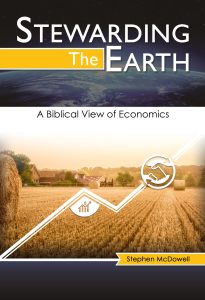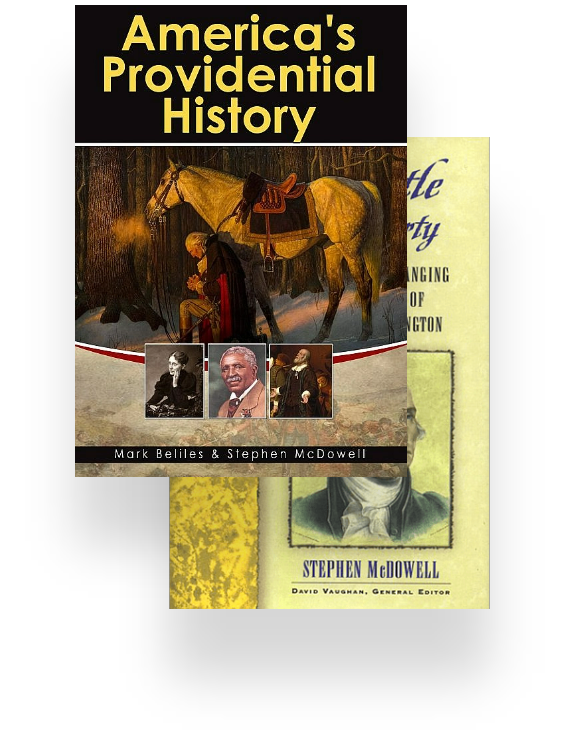PF UNIVERSITY

This article is an excerpt from Stephen McDowell’s new book, Stewarding the Earth, A Biblical View of Economics
God created man and the earth to be productive, to be fruitful (Gen. 1:11-12, 20-22, 24, 28). After making man, both male and female, in His image,
God blessed them. And God said to them, “Be fruitful and multiply and fill the earth and subdue it and have dominion over the fish of the seas and over the birds of the heavens and over every living thing that moves on the earth” (Gen. 1: 28, ESV).
The Hebrew word translated “subdue” is kabash, which means “to subdue, subjugate, dominate, bring into subjection.”[i] This word is also used in reference to Israel subduing the land of Canaan so it would provide for their needs (Num. 32:22, 29; Josh. 18:1). God placed man in control of His creation as His vice-regent or steward. We are called to subdue, have dominion over, and steward the earth in order to meet our needs and advance His creation commission. All living and non-living things are under man’s dominion.
Our stewardship is further explained in Genesis 2: “then the Lord God took the man and put him into the garden of Eden to cultivate it and keep it” (v. 15). Man’s mission was to cultivate the land God gave him. Every tree God created was good for food (Gen. 2:9). To keep trees, to cultivate land, to subdue the earth are actions of good stewardship.
In order to “be fruitful and multiply” we must subdue or control the earth. We are to develop and produce more and better goods from the earth. This is part of the mission God gave to mankind from the beginning. We are also to replenish the natural resources. God created living things such that they reproduce and multiply, making it possible for us to replenish the earth.
God’s creation is good because it was made by a good Creator, and the creation reflects the nature and character of the Creator (Rom. 1:20). It is also good because it enables man – God’s highest creation – to sustain himself and to progressively advance as he learns how to be a better steward. As man learns how to properly manage God’s property, he becomes more and more like God. He becomes a co-creator, taking the original creation material and using his God-given knowledge and talents to make new things that bring about the amelioration of mankind.Chapter 1 of Genesis tells us God’s creation is good – “God saw all that He had made, and behold, it was very good” (v. 31). Natural resources and the earth’s productivity are good. God’s physical creation is good. That is, material wealth is good. Many religions teach otherwise, and they have suffered from lack of material well-being in part due to this incorrect belief.
God’s blessing comes via man’s increased productivity using the resources He created in the earth and universe. Material abundance is a blessing of God (Deut. 8:7-10). Disobedience by man brought a curse upon him and the earth seen via hindered productivity (Gen. 3:17-19).
Material productivity is good. It is part of our godly mission. Productive occupations are good. Jesus and His apostles were involved in occupations that produced useful goods and services. Jesus was a carpenter, Paul was a tentmaker, James and John were fishermen. Many of His apostles continued their business while conducting their “religious” work of preaching the Gospel.
This original creation commission or cultural mandate was impacted by the fall of man but it was not abrogated. When Adam and Eve disobeyed God, they (and mankind in general) lost both their intimate relationship with God and their ability to properly steward the earth. Sin not only separated man from God but also brought a curse and great loss. Man was unable to properly fulfill the cultural mandate.
God’s redemptive nature is evident early on. After man fell from what God made him to be and to do, God planned both to redeem man and to restore man’s delegated authority and stewardship over the earth. God promised that the seed of woman would destroy the serpent, Satan (Gen. 3:15). Christ was that seed who came to redeem man and reverse the effects of the fall and the curse. He restored to man the ability to fulfill the mission originally given to Adam and also made it possible for man to once again have a personal relationship with God.
The story of redemption unfolds in the various covenants which God initiated with men. The giving of the law in the Mosaic Covenant was also used by God to further His redemptive program. Of course, God’s redemptive purpose has found ultimate fulfillment in the New Covenant through Christ, who was slain and by whose blood God has redeemed men for himself “from every tribe and tongue and people and nation” (Rev. 5:9).
The complete purpose of salvation in Christ cannot be understood unless we understand the original purpose of man. Salvation goes beyond getting men to heaven. It includes restoring man to his original position. Christ brought to man the restoration of the covenant he had with God, of the glory he had from God, and of the dominion mandate. Jesus also brought His kingdom rule and reign to all creation. He proclaimed and demonstrated the gospel of the Kingdom (that is, the government, righteousness, truth, and peace of God in all areas of life).[ii]
His atoning work also reversed the curse due to the fall of man. The curse affects individuals through death, sickness, and bondage, and in turn also affects all spheres of life. Christ brought redemption to individuals, but also institutions and all spheres of life (including law, government, education, arts, and business). Redemption is as broad as the sweep of sin.
God’s desire, as Jesus taught us to pray, is for His kingdom to come and His will to be done on earth as it is in heaven (Matt. 6:9-13). We have been redeemed for a purpose. In Christ we have been restored to sonship and are now in a position to obey both the cultural and the evangelistic mandates. With respect to the cultural mandate, God has restored us to stewardship. Through Christ we are called back to God’s original purpose—to live in His image and to “be fruitful and increase in number, fill the earth and subdue it. Rule over … every living creature that moves on the ground” (Gen. 1:28). We have been restored to serving God as his vice-regent over the earth. We have been enabled to steward the earth in accordance with God’s original design.
The theology of a people determines their economic condition. The choices men and leaders make come from their view of God and His laws. Man apart from God is lost. His sinful state affects how he thinks and acts. Unregenerate man tends not to recognize the most obvious truths. This is why many people today embrace socialism even though there are no examples currently or in times past where it has worked. It does not bring advancement to man, only lack and bondage.
Economic systems (as well as political, educational, familial, and scientific systems) ultimately rest upon faith, upon a people’s theological suppositions. One’s theological beliefs determine his worldview (his view of God, man, truth, family, government, education, history and all of life). One’s worldview determines his political philosophy, and one’s political philosophy determines one’s economic philosophy which determines the systems and policies established in a nation. To summarize:
Theology —–>>> Worldview ——>>> Polity ——->>> Economy
Political philosophy affects economics because the government is the house in which the economy lives. A biblical form of government is essential for the best economic system. The limited but important function of government regarding economic matters will be addressed in more detail later, but simply stated, the role of government is to protect the life, liberty, and property of its citizens. It is to keep the market free and fair. It is to provide a peaceful environment so that man can most effectively steward the earth. President Grover Cleveland explained the limited function of government: “Though the people support the government the government should not support the people.”[iii]
Government exercises force, while the economic sphere relies upon voluntary cooperation. Eternal vigilance over our government is necessary for economic freedom. Left alone, the tendency is for governmental power to increase. Thomas Jefferson said, “The natural progress of things is for liberty to yield and government to gain ground.”[iv] As the size and power of government grows, individual liberties are lost. A biblical economic system cannot be maintained without a biblical governmental system.
To learn what a biblical economic system looks like see, Stewarding the Earth, A Biblical View of Economics
[i] Strong’s Concordance, kabash (no. 3533), Wayne Grudem, Politics According to the Bible, Grand Rapids: Zondervan, 2010, p. 269.
[ii] See Stephen McDowell, The Kingdom of God, Charlottesville: Providence Foundation, 2012.
[iii] Tom Rose, Economics: Principles and Policy From a Christian Perspective, Mercer, Penn.: American Enterprise Publications, 1996, p. 83.
[iv] Rose, p. 73.
PF UNIVERSITY
The courses offered by the Providence Foundation Biblical Worldview University (BWU) are designed to equip leaders of education, business, and politics to transform their culture for Christ, and to train all citizens how to disciple nations.
DONATE
Support Providence Foundation today! Choose Minuteman, Patriot, or Founder level and make a monthly impact. Or select ‘Custom’ to contribute now. Join us in shaping our nation’s future
